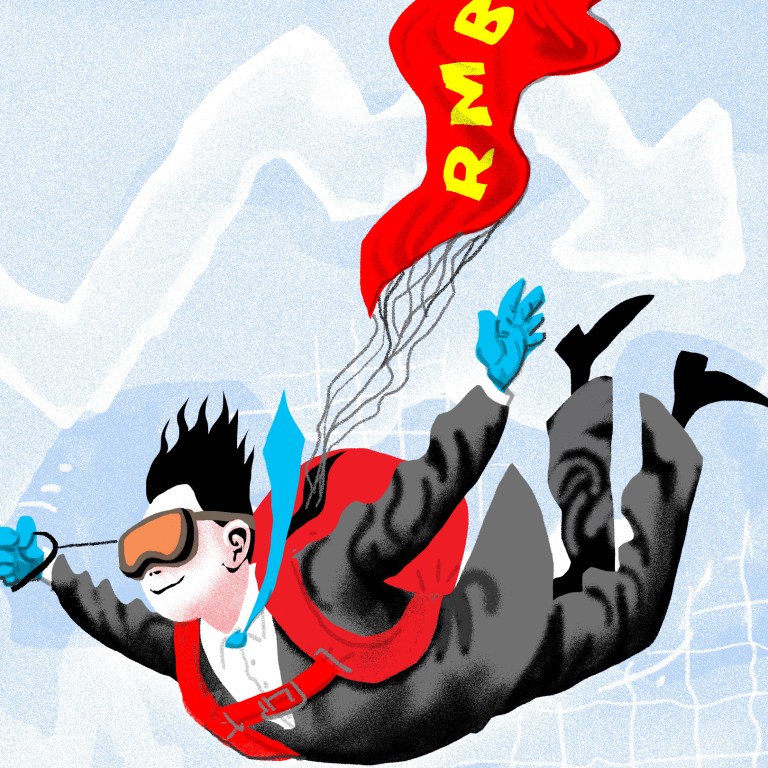
Why international markets are wrong to expect continued renminbi depreciation
G. Bin Zhao says Beijing has some tough choices to make as part of its move towards a market-driven exchange rate

There are tough choices to be made over the renminbi exchange rate, which is in the early stages of market-oriented reform. According to international market expectations, the renminbi is expected to continue to depreciate. However, the Chinese government, including the central bank, does not agree.

The fact that the international market almost overwhelmingly thinks the renminbi will continue to fall in 2016 is inadequate proof that it will actually happen. An overview of world economic history shows that there is little likelihood of people actually predicting the reality, and sometimes the results may be just the opposite.
READ MORE: Falling oil prices are a benefit, but it will take time to see that
Take crude oil prices, for example. No one would have predicted the current price two years ago. When the price fell below US$30, some expected it to fall further, to US$20, or even more outrageously, to US$10. When most oil production companies worldwide are facing losses, and the crude prices seriously deviate from the cost of production, can the price reflect the proper value?

The main reasons why international markets expect further renminbi depreciation are: the US economic recovery; the Federal Reserve raising interest rates; and, the appreciation of the US dollar. Secondary reasons can be tied to China’s economic slowdown, the stock market crash, and so on.
In fact, the US dollar has appreciated considerably against the currencies of most developing countries, and also against the major currencies of developed nations over the past year. However, it’s hard to know whether this trend is sustainable in 2016, given the concerns about the momentum of the US economic recovery.
The pace of development is still among those of the leading countries globally
If China’s economic slowdown is regarded as the basis for renminbi devaluation, and even if GDP growth rates in 2016 fall from the current 6.9 per cent to 6.5 per cent or even 6 per cent, the pace of development is still among those of the leading countries globally, so why can it not support the currency exchange rate?
The impact of the Chinese stock market decline on the exchange rate is relatively limited, mainly because it represents a relatively small percentage of the real economy and therefore has limited impact on it. In the dotcom crash era from 2000 to 2002 in the US, the dollar depreciated about 30 per cent against major currencies, mainly because US$5 trillion of stock market value evaporated, a huge hit at the time.

This is a serious mistake. The renminbi exchange rate is not yet fully market-oriented, and the offshore Hong Kong market is much smaller than the onshore market. How can the pricing mechanism of a small market determine that of a large one? Moreover, the offshore Hong Kong exchange rate represents only a part of the overall exchange rate pricing mechanism, and so cannot be the benchmark for the renminbi exchange rate.
Not only has the international market mistakenly priced the renminbi exchange rate, but many domestic agencies, media outlets and individuals have also accepted this one-sided view, thus adding to the voices proclaiming that almost the entire market believes the currency will continue to fall in 2016.
No reform is fulfilled in one step, and that applies to renminbi exchange rate reform as well
No reform is fulfilled in one step, and that applies to renminbi exchange rate reform as well. The Chinese government has repeatedly said it will insist on the principles of being autonomous, progressive and controllable when implementing reforms of the exchange rate mechanism. When Premier Li Keqiang (李克強) talked to Christine Lagarde, head of the International Monetary Fund, recently, he re-emphasised these points. But some market participants wishfully think that the offshore Hong Kong exchange rate represents the market price.
While domestic and international markets, as well as the media, basically agree that the renminbi will continue to devalue this year, government voices have been fragile and weak. Frequent incidents of dishonesty under the previous administration have eroded officials’ credibility and it is quite common to be distrustful of the government.
READ MORE: Why stalled reforms are a bigger worry for China’s economy than a hard landing
Since the renminbi exchange rate mechanism is moving to be more market-oriented, different parties are fighting for the authority to speak for and influence the rate. The international market has clearly gained the upper hand at present. If the situation is left unchecked, the central bank will be very passive, and the onshore market will be directed by the offshore Hong Kong market. This explains the recent frequent interventions in Hong Kong by the central bank.
I firmly believe that the renminbi will continue its internationalisation; in order for the currency to become accepted in global circulation and reserves in the future, the exchange rate must be fully market-driven. However, right now, the government cannot totally let go because, if the international market has the final say on exchange rate pricing, it will create major risks in the Chinese economy. This also explains why China has successfully sustained its economic development for almost four decades.
We should not forget the painful lessons of rapid economic liberalisation in some countries; the market will have to be patient.
G. Bin Zhao is co-founder of Gateway International Group, a global China consulting firm, and executive editor at China’s Economy & Policy

